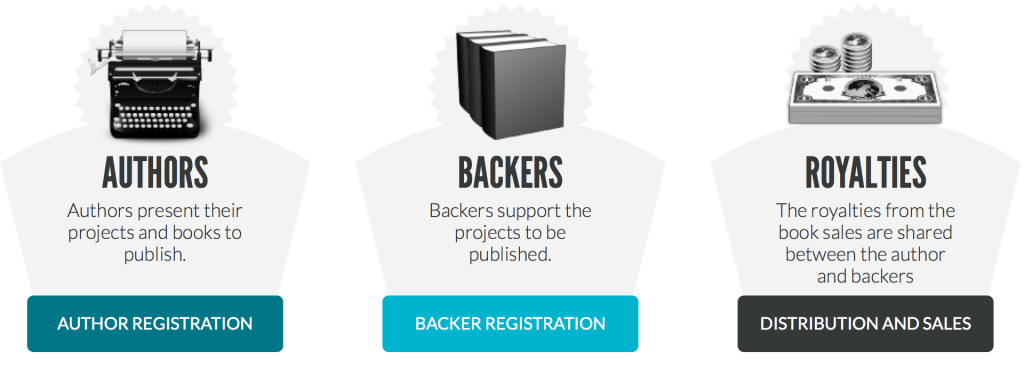 As more and more authors seek to be independently published, and traditionally published authors feel the pressure to spend on marketing even in the face of shrinking advances, savvy marketers and publishers alike are seeking ways that authors can raise the funds to cover the initial costs of editing, cover design, and marketing (i.e. author websites, training, PR campaigns).
As more and more authors seek to be independently published, and traditionally published authors feel the pressure to spend on marketing even in the face of shrinking advances, savvy marketers and publishers alike are seeking ways that authors can raise the funds to cover the initial costs of editing, cover design, and marketing (i.e. author websites, training, PR campaigns).
That’s why we’ve been fans from the get-go of author crowdfunding options. We know many published authors who’ve been able to get their start here, raising needed funds WHILE establishing a number of book pre-sales, which in turn helped those newly published books hit the ground running, raising their ranks at Amazon, attracting more reviews, etc.
 This year’s BEA introduced us to a new player in the author crowdfunding space, too, an innovative publisher, Pentian. They began as a traditional publisher in Spain in 2004, then began offering self-publishing in 2009, then decided to build in their own crowdfunding layer, with a twist: Pentian’s crowdfunding system allows individual backers to share royalties with the author. For a pledge of $10, $20, or $50, donors may get a signed copy AND a percentage of sales in proportion to their contribution amount.
This year’s BEA introduced us to a new player in the author crowdfunding space, too, an innovative publisher, Pentian. They began as a traditional publisher in Spain in 2004, then began offering self-publishing in 2009, then decided to build in their own crowdfunding layer, with a twist: Pentian’s crowdfunding system allows individual backers to share royalties with the author. For a pledge of $10, $20, or $50, donors may get a signed copy AND a percentage of sales in proportion to their contribution amount.
Starting in Spain and picking up steam in Europe, Pentian gained momentum last year at Digital Book World and this year has expanded to offices in New York and California.
Crowdfunding Pros and Cons
Crowdfunding is a non-starter if you aren’t willing to share and push the fact that your book is out there. The most successful projects succeed because their authors are putting in the work to share that folks can “buy in” for pre-orders and signed copies.
Authors often think of crowdfunding as a charity; it’s not. Take a look at other campaigns and you’ll see that the initial buyers get something special, whether it’s that signed copy, or a gift w/ purchase. And scheduling pre-orders this way can also put you ahead of the curve when it comes to soliciting those folks for reviews and asking them (nicely) to share the news of your book.
Crowdfunding with Pentian means you’re publishing with Pentian, period. Which means you can’t enjoy the flexibility of an author crowdfunding platform where an author sets their budget, uses the money their way, and the crowdfunding becomes a platform builder for a book’s pre-sales.
And, some authors may not like getting locked into sharing their royalties for 36 months (though there’s nothing stopping you or your family members from backing the project, too — and many do, to keep a larger portion of their royalties).
But on the upside, because Pentian puts a cap on the amount of money raised (unlike Kickstarter), the sense of urgency to “get in while you can” typically helps get books 100% funded. We saw many, many examples of 100% funded projects at Pentian.com, so the model is working from that sense.
If a book fails to reach its goal, that’s a pretty good sign a book might not be “ready for prime time.” And at that point an author can try again, or pull the book.
 Another interesting upside of this model is that the backers have a stake in book’s success. Translation: they’re motivated to market and share the book’s news, too! As was reported at Digital Book World, “A traditionally self-published book has one person, the author, with a financial stake in the book’s success. And that author alone slogs through his or her social media marketing campaign. But a book with fifty backers has fifty people who want the book to succeed. They often spread the word to their own networks.”
Another interesting upside of this model is that the backers have a stake in book’s success. Translation: they’re motivated to market and share the book’s news, too! As was reported at Digital Book World, “A traditionally self-published book has one person, the author, with a financial stake in the book’s success. And that author alone slogs through his or her social media marketing campaign. But a book with fifty backers has fifty people who want the book to succeed. They often spread the word to their own networks.”
That’s something we believe has a great deal of merit, because as the sharing space becomes more and more crowded, and readers are inundated with messages, there’s less and less motivation to share book news. Any author who’s done a giveaway on Goodreads will tell you that even after sending a signed copy, the recipients often never do get around to sharing a review.
But, if you’ve spent $50 to back a book, obviously it’s in your best interest to share that book’s news wherever you can and earn half a percent’s royalties for the next three years! Will you get rich doing it? No, but it’s a low-risk way to play along at being in an author/publisher’s shoes (and maybe learn a few promotional tricks for your own work along the way…).
 Best of all, if you’re tempted, as we were, to go fund a book, you’ll get refunded if the book doesn’t get 100% funded. But if it does, then you’re along for the ride and have a chance to profit by sharing your favorite authors. Plus, your “investment” as a backer does include some book perks, too. In the example we tried, $50 invested in “The Sisters Etcetera” offers you a personalized hardcover copy, along with a DRM-free eBook, and 0.5% of all backer royalties for the next three years.
Best of all, if you’re tempted, as we were, to go fund a book, you’ll get refunded if the book doesn’t get 100% funded. But if it does, then you’re along for the ride and have a chance to profit by sharing your favorite authors. Plus, your “investment” as a backer does include some book perks, too. In the example we tried, $50 invested in “The Sisters Etcetera” offers you a personalized hardcover copy, along with a DRM-free eBook, and 0.5% of all backer royalties for the next three years.
Books published by Pentian are available on Amazon and the Apple iBookstore as well as through Ingram. And, when a campaign finishes and the book is fully funded, your campaign page turns into a promotional page for your book.
So tell us, tribe, what do you think of this model? Want to learn more? Visit Pentian’s FAQ page.

Interesting. While I applaud anyone out there trying to help out indie authors, there are some portions of this model that do not sit well with me. I successfully funded my first 2 children’s books on Kickstarter and while it – or any crowdfunding platform really -is a lot of work, the Kickstarter model continues to impress me the most. Differences? I was able to shop for any publisher than suited me and i did NOT give 60% of my sales for 3 years. I was able to raise more than I initially asked for because my campaign ended in 30 days even though I was funded earlier. My backers were charged only if and when my campaign successfully raised the goal amount. The fact that technically someone could back me on my first day of a 60 day Pentian campaign, be charged $50 immediately and then not get their money back for another 30 days after a failed campaign makes me a little queasy. I am happy that this model has lead to “success” for some authors but for me personally? – Nah, I’d still recommend Kickstarter.
Patti – thank you VERY much for taking the time to give us some intel on Kickstarter – we’d not run into many successful authors here and good to see this is another platform that worked for you! I agree the Pentian model might make me queasy re: not getting cash back for 30 or 60 days, but it seems to have worked so far. What I DO like is that an author can always also buy into themselves and therefore not give away so much… And still like Pubslush because its focus is all authors; but also because of the flexibility, like Kickstarter, to choose a publisher… Think my next Q to all three would be what percentage of author campaigns do get fully funded?